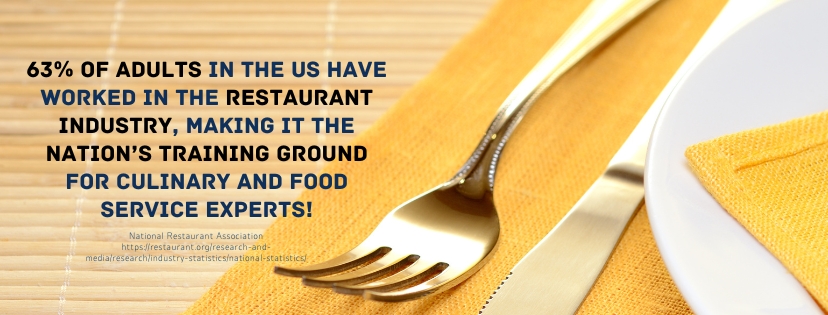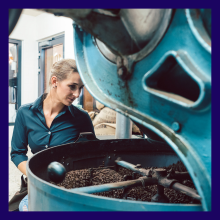A job in culinary arts is one of the most rewarding and lucrative career paths that those passionate about food can ever take. If you enjoy creating savory food and arranging impressive food presentations, then pursuing some of the highest paying culinary jobs can be an ideal choice. They may be involved in cooking, preparing, and overseeing other aspects of the culinary industry such as meal plans, event operations, and cost control.

Moreover, the culinary industry is booming and growing fast. In fact, the Bureau of Labor Statistics saw a 15% growth in the job outlook for chefs and head cooks. This is much faster than average. While it does have its challenges, a career in the culinary field offers a wealth of benefits and opportunities for career advancements. Working as a chef, for example, allows one to indulge their creative side by producing interesting flavors and inventing new recipes. Jobs are available for many types of chefs: personal chefs, executive chefs, and pastry chefs.
There are also all sorts of culinary jobs beyond the position of chef that one can pursue. Culinary businesses also employ kitchen staff, bakers, nutritionists, food service managers, and many more. All of these jobs make for a great culinary experience in the food service industry.
Advantages of Pursuing the Highest Paying Culinary Jobs
Combining their passion for food with their desire for providing exceptional service, culinary arts professionals often enjoy a fulfilling career. This career path has many advantages. For those still weighing their options and wondering whether pursuing a job in the culinary industry is a good fit for them, these career highlights are worth considering:
Constant Professional Growth
The culinary industry is evolving constantly. It is always a good idea for chefs and other food service professionals to brush up on their knowledge and skills to keep up with the latest trends or developments in food preparation and other aspects of running a restaurant. Taking part in training can help them gain novel culinary traditions and techniques and be the best in their field.
Great Salary Potential
Most culinary professionals enjoy a comfortable salary. Some of the highest paying culinary jobs include executive chefs, food scientists, food tasters, and more. Depending on experience and their location, they can earn as high as $92,000. Having a culinary arts degree can also help a lot in boosting their credentials. Those with management skills can even take on a supervisory role, which most employers value.
Working with a Talented Team
People who thrive in working with others will find a culinary art career ideal for their interests and career goals. They can surround themselves with creative and talented individuals, receive mentorship, and collaborate with prestigious chefs and other professionals in the culinary industry.
Essential Skills for the Highest-Paying Culinary Jobs
Despite the wide range of job descriptions, the highest-paying culinary jobs require a certain set of common skills. Perhaps most important among these is a meticulous adherence to cleanliness, hygiene, and food safety.
They may not all directly engage with clients, but they must also keep customer satisfaction as their top priority. Food is an experience, and this requires optimum culinary skills, such as attention to detail and a bit of creativity in many instances.
Lastly, their workplaces can be highly dynamic and demanding, and not only must these professionals be able to function as part of teams, but they also have a sense of leadership and initiative and be able to handle pressure and thrive in it.
The Highest Paying Culinary Jobs
Executive Chef

Education: At least 2-year culinary education
Annual Average Salary: $92,082
As an executive chef, one will oversee the kitchen staff and ensure the quality of food choices. They oversee the food preparation process and hire and train staff who fulfill different roles in the kitchen, including those who cook the dishes, expedite orders and invent dishes that can be added to the menu. Executive chefs are often found in restaurants and hotels. It is important that they are creative and service-oriented.
Private Chef
Education: Associate’s degree in culinary arts
Annual Average Salary: $88,002
Often hired exclusively by clients, private chefs ensure that specialized meals are prepared. They often work either in the clients’ kitchens or on their own. A personal chef is expected to plan the meals based on the specifications, preferences, and dietary needs of clients. At times, they may need to shop for the ingredients they need for meal preparations and even package the meals accordingly.
Food Scientists & Technologists
Education: Bachelor’s degree in Food Science or related discipline
Annual Average Salary: $84,150
The development and manufacturing processes, along with food and drink products’ recipes, fall under the expert hands of food scientists and technologists. Their work usually includes researching food safety, improving food products, and devising methods to maintain the food supply. They may be hired by restaurants and other establishments in the food service industry to determine the taste and stability of foods.
Pastry Chef
Education: (Minimum) High school diploma or GED or an associate’s degree in pastry arts
Annual Average Salary: $65,091
Often working in the kitchen, a pastry chef is responsible for making various baked goods to be added to the menu. They often make cakes, chocolates, cookies, cupcakes, pies, bread, and so much more. Not only do they make baked goods; but they also ensure that their creations are decorated and presented impressively. Their duties may also include ordering ingredients and supplies and hiring those who can assist in producing pastry goods.
Sommelier
Education: Associate’s degree in wine technology
Annual Average Salary: $62,310
Also known as a wine expert, a sommelier’s responsibilities include creating a list of wines that pairs with the food on the menu, which they can recommend to clients and patrons. They constantly create and update wine lists and make recommendations on the best wine pairings. Guests trust their knowledge and personal taste in wine.
Nutritionist
Education: Bachelor’s degree in health, nutrition, or a related field
Annual Average Salary: $61,650
Nutritionists are not only found in hospitals and other health-related facilities. They can also be hired by restaurants to develop new flavor profiles and ingredient combinations in a way that still meets nutritional standards. Those with a strong culinary background will be the best fit for the role. Nutritionists will need to be able to work well with the culinary team and suppliers to be successful in the field.
Restaurant Manager
Education: High School Diploma or Equivalent
Annual Average Salary: $59,440
Most of the businesses in the food service industry need someone qualified to ensure the daily operations of restaurants, bars, café, and more will go smoothly, especially when it comes to the business side of things. This is something that a restaurant manager, also known as a food service manager, is known to do. They are responsible for planning, organizing, directing, controlling, and evaluating the different aspects of running a restaurant. A food service manager may also need to oversee the training of other staff members and set their work schedules while monitoring their performance.
Food Critic
Education: Bachelor’s degree in journalism, communications, English, or a related field
Annual Average Salary: $53,978
As a professional writer, a food critic will sample and review food in restaurants and other establishments in the culinary industry. They travel to different restaurants, order a variety of dishes, and create a review of their experiences. Their works are often published in magazines, blogs, food websites, and even newspapers.
Culinary Instructor
Education: Bachelor’s degree in culinary arts
Annual Average Salary: $51,809
An important part of the culinary field, culinary instructors teach students the ins and outs of the culinary arts. They cover topics such as supplies, pricing, menu, planning, food sanitation, and food safety, among others. Students will also get to learn different culinary terminology, food cuisines, and so much more.
Food Taster

Education: Bachelor’s Degree in physical or food science
Annual Average Salary: $51,498
Ensuring the quality of food products, a food taster’s various tasks involve testing food products according to different elements for quality assurance. This includes looking at the food products’ appearance, smell, taste, flavor, and quality of ingredients. They can be found working for food manufacturers and restaurant owners.
Chefs and Head Cooks
Education: High School Diploma or Equivalent, plus experience
Annual Average Salary: $50,160
The Chef, or Head Cook, lies at the helm of the typical kitchen. The term chef belongs to the Brigade System, which is the typical system employed in American and European kitchens. Head chefs direct all aspects of a typical kitchen’s day-to-day operations, which include planning and developing the menu, ensuring the quality of the dishes, tracking expenses and inventory, and adhering to cleanliness and safety standards. A head chef’s roles typically expand as kitchen sizes grow, and so do the size of the teams they direct.
Sous Chef
Education: High School Diploma or Equivalent, plus experience
Annual Average Salary: $49,652
A Sous Chef is essentially the second-in-command in a kitchen operating under the Brigade System. Working under the direction of a head chef, sous chefs help direct and manage the various stations assigned to subordinate chefs. Aside from hands-on meal preparation and plating work, sous chefs also perform administrative tasks like menu planning, inventory management, and training duties.
Food Photographer
Education: Bachelor’s degree or equivalent formal training recommended
Annual Average Salary: $44,077
Food photographers take photos of food for use in advertisements, magazines, packaging, cookbooks, or other forms of print media. In some more extensive advertising campaigns, they may also work closely with video production professionals. Like with other genres of photography, a good food photographer must be creative, have an artistic eye, and have a deep knowledge of various food items and ingredients and how to work with these to achieve the most visually appealing results.
Research Chef
Education: Bachelor’s Degree
Annual Average Salary: $43,740
A research chef is also known as a culinary scientist or sometimes an R&D Chef. Unlike typical Brigade System chefs who work in commercial kitchens, Research chefs are typically found in food research laboratories and are primarily involved in product innovation and development. Often working closely with food scientists, the result of their work is in full display in a variety of places, such as a restaurant chain’s new dishes, a food company’s new food/beverage, and even in meal rations provided to the armed forces, which are designed to last several years. Some research chefs also work in food safety, performing product testing and nutritional analysis.
Coffee Roaster

Education: High School Diploma or equivalent, plus experience
Annual Average Salary: $37,741
You never usually see them since they mainly work behind the scenes, but a coffee roaster’s work directly affects your enjoying your cup of coffee. Coffee roasters are professionals who ensure that every batch of coffee beans is roasted to perfection and within strict quality standards. Coffee roasters not only have full mastery of the various equipment involved in the roasting process, but they are also expected to know the ins and outs of the various varieties of coffee they work with.
Food Processing Equipment Worker
Education: High School Diploma or Equivalent
Annual Average Salary: $35,430
Food processing equipment workers are typically found in food factories and are part of the army of workers that are involved in the food manufacturing industry. Within the context of food processing lines, they usually operate a specific type of equipment which performs a specific task. Food processing equipment workers are expected to have the right mentality and habits that foster a safe and sanitary work environment.
Baker
Education: No formal educational credential
Annual Average Salary: $29,750
Bakers are in charge of producing a range of baked goods, which include bread, pastries, cakes, and others. Bakers work in a variety of settings: those in large commercial bakeries often utilize heavy machines and direct teams of personnel in high-volume production runs, while retail bakers tend to work with relatively smaller production volumes, work with fewer staff, and may even take on more tasks themselves, such as inventory management and staff training.
Food Preparation Workers
Education: No formal educational credential
Annual Average Salary: $28,780
Food preparation workers are found throughout the industry, from factories and food processing plants to hotels, restaurants, catering services, and more. They form teams that perform non-cooking tasks, including cutting meats, vegetables, and fruits, weighing and measuring ingredients, brewing and preparing beverages like coffee or tea, and helping maintain equipment. Depending on the size of the kitchen, food preparation workers may be trained to use a variety of specialized equipment.
Bartender
Education: No Formal Educational Credential
Annual Average Salary: $26,350
Bartenders are a familiar staple sight throughout night spots, especially for those who love to spend their nights in bars, clubs, and similar establishments. Their work revolves around preparing, mixing, and serving drinks to customers, along with any accompanying food items. Given the presence of alcohol, their work is unavoidably dynamic, as it also involves engaging with guests, ensuring they have a good experience, and also monitoring intoxication levels. Bartenders also play a security role, spotting potentially dangerous situations like fights or situations that may lead to abuse or assault.
Coffee Barista

Education: High school diploma or GED, plus additional training
Annual Average Salary:$24,200
Baristas are essentially the face of coffee shops, performing the same beverage preparation and serving roles like bartenders but without alcohol. Depending on the items on offer, baristas may also prepare food items and they also do cleaning duties. Like bartenders, baristas also typically undergo some degree of technical training, most visible in the latte art we’ve come to know from our local coffee shops.
Final Thoughts
The culinary arts overlaps with a number of service and manufacturing industries, and the list of the highest-paying culinary jobs involves those found in a wide range of fields. The paths to these various culinary careers vary; some may require basic educational qualifications, while others may need a bachelor’s degree as a minimum. Realistically, though, upward movement and career advancement are determined largely by experience, which typically takes several years.
The jobs in this list belong to highly demanding industries, and those looking to enter should have a mindset that prioritizes cleanliness, food & workplace safety, quality of service, and the satisfaction of clients. They must also be very creative, possess problem-solving skills, and handle pressure well.


